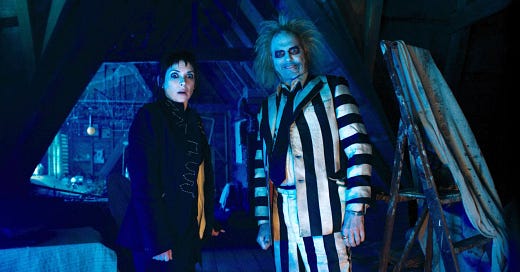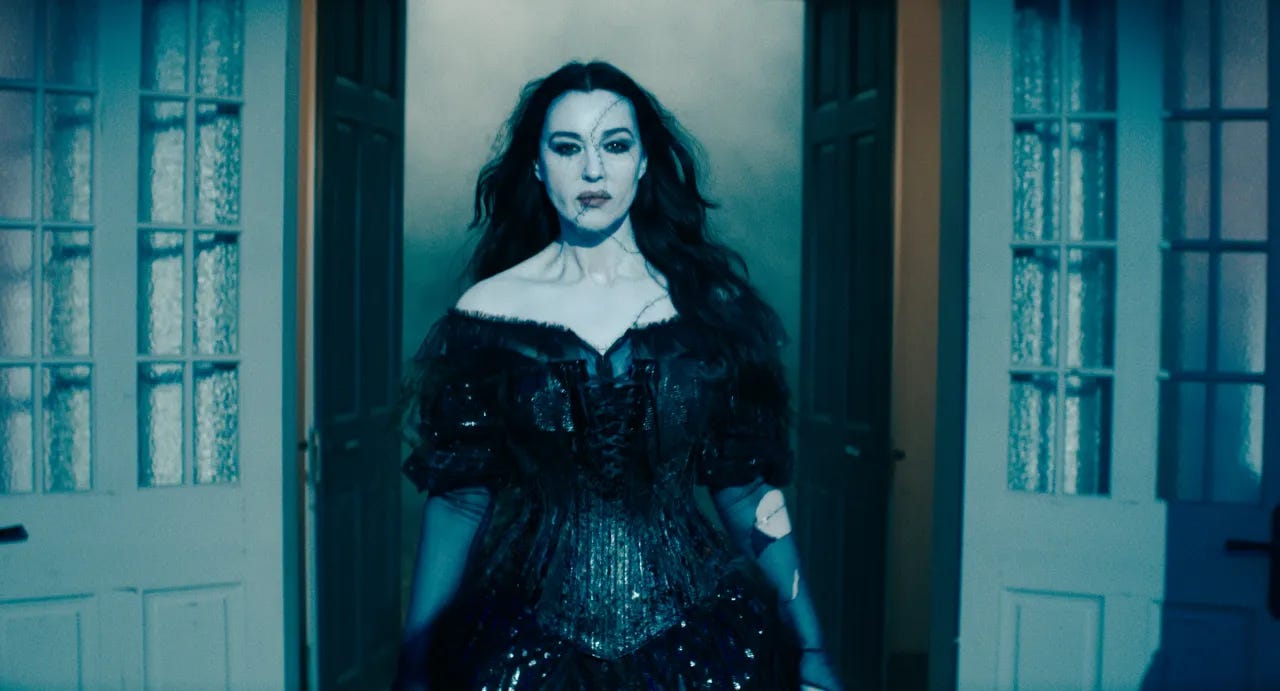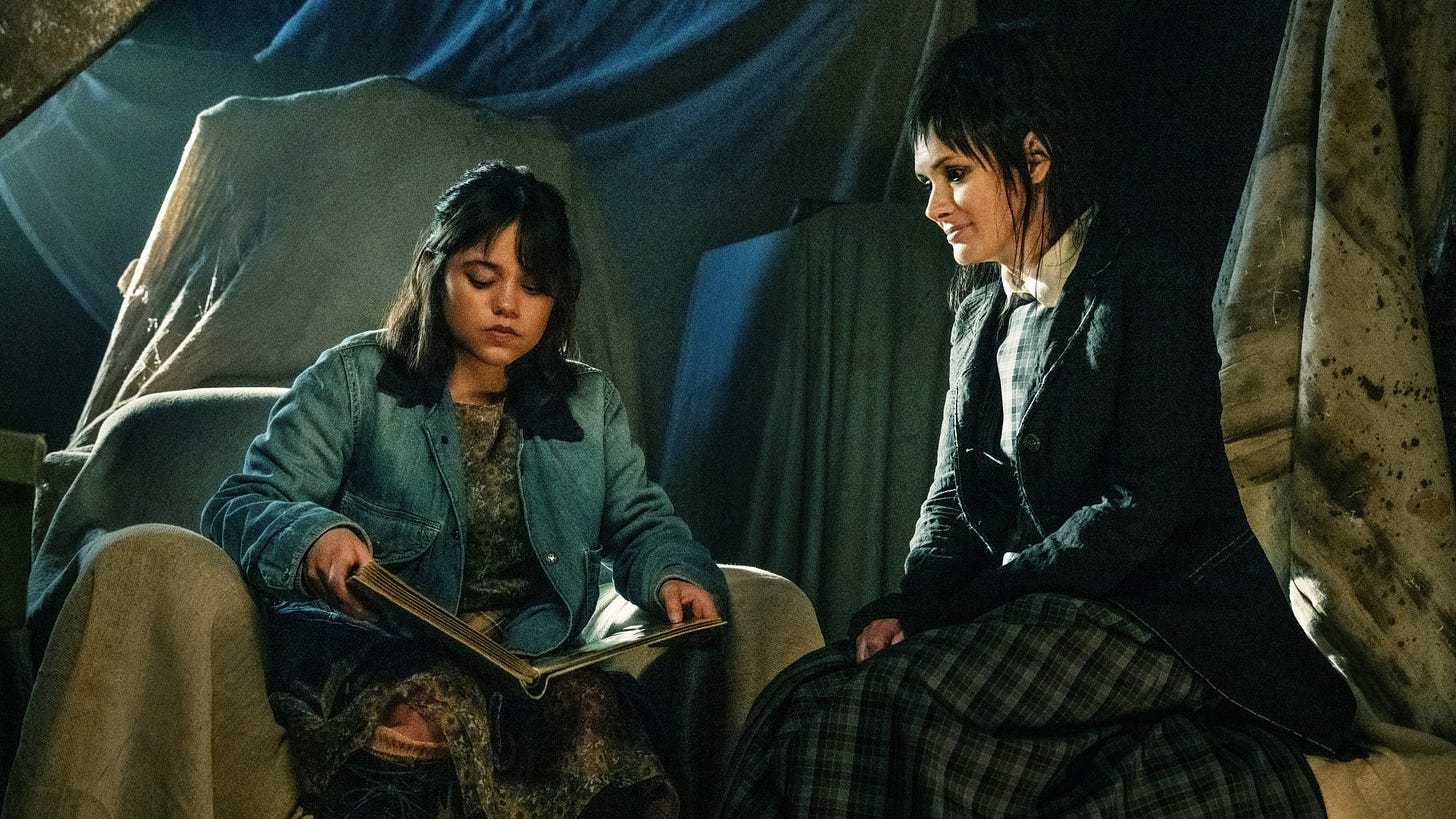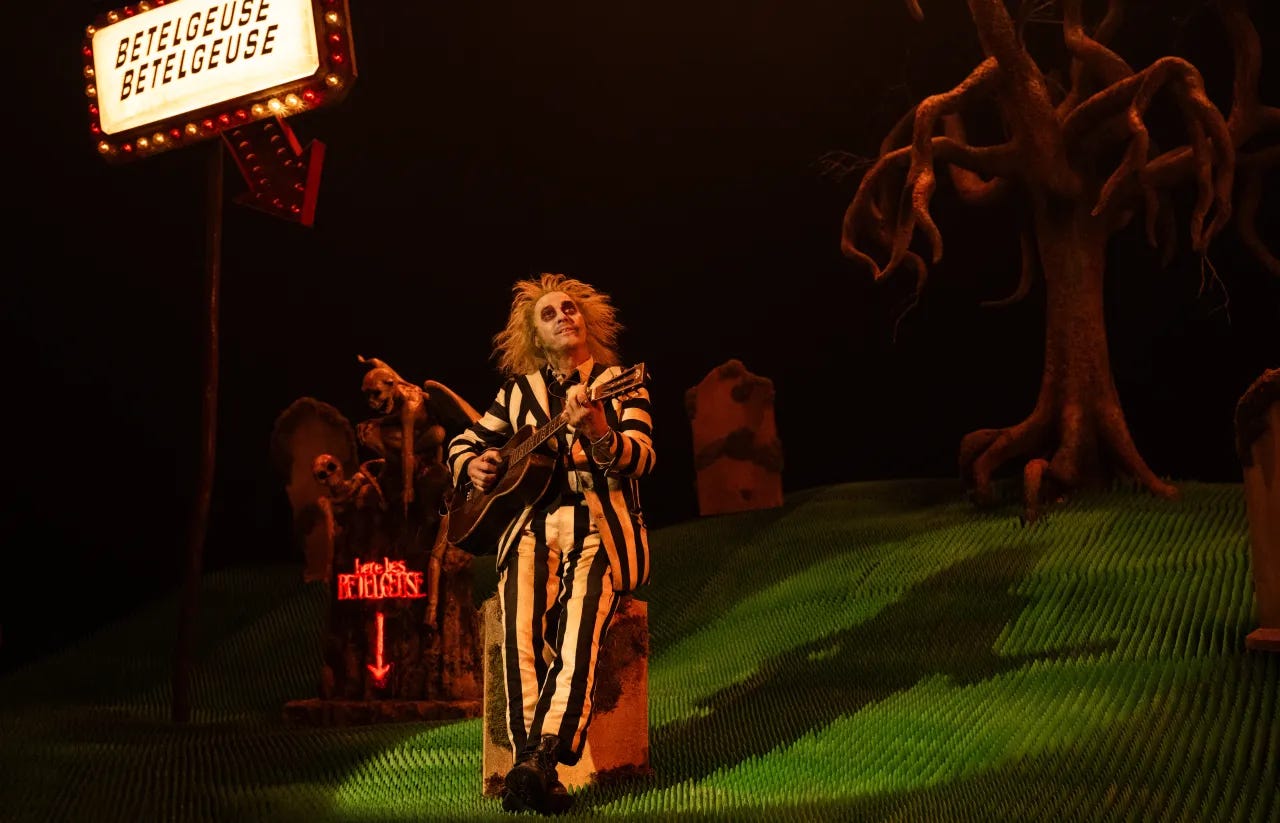More is less in the uneven legacy sequel ‘Beetlejuice Beetlejuice’
But at least everyone is having fun
Welcome to Girl Culture, the newsletter where Caroline Siede examines pop culture, feminism, and more. You can learn about Girl Culture’s mission here and support here.
Tim Burton’s career has been defined by excess and restraint. When he burst onto the scene with 1988’s Beetlejuice, it was thanks to a film dripping in stylish visual originality but restrained in its 92-minute, vibes-over-plot storytelling. And when he began to lose his way with projects like Charlie and the Chocolate Factory and Alice in Wonderland, it was due to a mix of bloated plotting and even more bloated visuals. Now with his new sequel Beetlejuice Beetlejuice, Burton has rebalanced the scales in a curious way. Visually, this is the most inventively restrained he’s been in years—limiting himself to the tactile creativity of the 1980s original rather than relying on over-the-top CGI. But plotwise, I’m not sure a Burton film has ever been more unnecessarily convoluted.
By my count, there are no fewer than six ideas jostling to be the central hook of this legacy sequel, which picks up 36 years after the events of the first film. The inciting incident sees Lydia Deetz (Winona Ryder), her stepmom Delia (Catherine O’Hara), and Lydia’s teenage daughter Astrid (Jenna Ortega) return to Winter River, Connecticut to mourn the death of family patriarch Charles Deetz. Down in the underworld, meanwhile, a hammy ghost detective played by Willem Dafoe gets word that a vampy demon named Delores (Monica Bellucci) is on a murderous rampage looking for her “ghost with the most” ex-husband. Yet despite their early importance, both of those storylines wind up being comedic runners more than anything else.
The actual heart of the film eventually pivots to Lydia and Astrid’s mother/daughter relationship, which we learn has been fractured since Astrid’s dad died several years ago. Only digging into that dynamic also involves extended screentime for Justin Theroux as a smarmy love interest for Lydia and Arthur Conti as a sweetly nerdy one for Astrid. Plus, of course, Michael Keaton’s Beetlejuice is running around causing trouble. And that’s not even mentioning a local small town priest, a host of underworld cretins, and an office full of shrunken-head men.
Now, don’t get me wrong, I understand that most people aren’t coming to a Beetlejuice sequel for airtight plotting. But the sheer amount of storylines unfolding in this 105-minute romp wind up undercutting both the madcap pacing and the genuine pathos the film is going for. The script was written by Wednesday creators Alfred Gough and Miles Millar with a story credit for Burton’s Dark Shadows collaborator Seth Grahame-Smith, and, well, it feels like an oddly paced Netflix TV show mashed up with an overstuffed ensemble dark comedy.
How much you enjoy Beetlejuice Beetlejuice will ultimately come down to how much you care about thematic cohesion and how much you’re bothered by plotlines that start and stop at random. Because when Beetlejuice Beetlejuice isn’t tying itself into convoluted storytelling knots, it can be a pretty fun movie—right down to a big climactic musical sequence that manages to give the iconic “Day-O” scene a run for its money. Burton explained that his goal with this sequel was to “strip everything and go back to the basics of working with good people and actors and puppets” and, at its best, that’s very much the feeling of the film, which is bolstered by the kooky, handmade quality that made the original Beetlejuice such a cultural sensation.
And while the story may barely hang together, there’s at least an overall sense that everyone involved in this movie wants to be here, which isn’t always the case for a legacy sequel. Ryder, O’Hara, and Keaton effortlessly slip back into roles that made them icons in the late ’80s, while Ortega and Dafoe bring some fresh comedic energy to the proceedings. Though Delores’ “lady Beetlejuice” storyline does little more than fulfill Burton’s quota for putting his romantic muses in his films, I appreciate how much Beetlejuice Beetlejuice anchors itself around Delia, Lydia, and Astrid as a multi-generational trio of uniquely eccentric women.
Delia’s an artist, Lydia’s a goth ghost whisperer, and Astrid is a teen activist, but they’re united by a certain deadpan self-awareness that really does make them feel like family. And while I would’ve loved a deeper exploration of how growing up with human/ghost co-parents shaped Lydia’s present-day personality, her warm connection with Delia at least builds on the original film in a satisfying way.
I also appreciate how Burton manages to sand off some of Beetlejuice’s more lecherous edges without losing the character’s gross, gruesome sense of humor in the process. Mr. Juice is still as sleazy and unhinged as ever, the film just feels a little fresher for not lazily defaulting to sexual harassment as comedy. And Keaton is clearly having a blast getting to go all-out in such a goofy theater kid way again. It’s just too bad it takes Beetlejuice Beetlejuice so long to get around to a throughline that gives Beetlejuice and Lydia something meaningful to do together, which really should’ve been its central hook to begin with.
In fact, when I saw the Beetlejuice musical last fall I was really impressed by the way it added camaraderie and emotional depth to the simple premise of the original and was hoping this sequel would do the same. Instead, I found myself thinking of Hocus Pocus 2—another spooky legacy sequel that I enjoyed well-enough as an afternoon diversion but haven’t really thought about since. Like Hocus Pocus 2, I don’t think Beetlejuice Beetlejuice will have much cultural staying power beyond its initial debut, nor do I think it will tarnish the legacy of the original. Instead, Burton’s mix of compelling visuals and overstuffed plotting adds up to a movie that’s entertaining but inconsequential. If the original Beetlejuice found strength in simplicity, this sequel is less than the sum of its many, many morbid parts.
Other stuff I’ve worked on lately: I joined a Canadian radio show to discuss the final season of The Umbrella Academy, and weighed in one AppleTV’s darkly funny new docuseries K-Pop Idols for The Daily Beast.








You pretty much nailed it. It's a very good time with way too much going on, well made fluff I won't be thinking about much in a few weeks. But given the low expectations we have for legacy sequels, it's practically a home run! Given that I rewatched the original the night before seeing it, I'm glad I felt satisfied with what it pulled it off in the end.